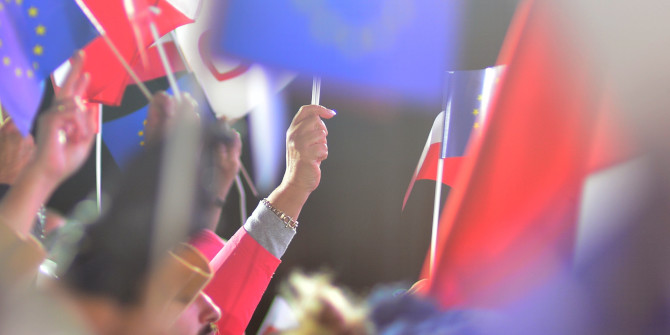Since 2019, the European Commission has launched a series of initiatives aimed at strengthening the EU’s role in setting the standards that govern the internet. Drawing on a new study, Clément Perarnaud and Julien Rossi examine whether this shift in approach has produced significant changes in the way the EU engages with the issue.
The internet is a network of independent networks communicating with one another thanks to shared protocols and standards like the Internet Protocol (IP). Many of these protocols and standards automatically come into play when someone reaches a webpage or sends an email. They are the heart of the internet as we know it.
Internet standards are usually produced within private organisations, such as the Internet Engineering Task Force (IETF), and more rarely within formal standard-developing organisations such as the International Telecommunication Union (ITU) of the United Nations, in which states play a larger role. These forums are an integral part of internet governance through which state actors and large companies compete to define what the future of the internet will be.
Escalating trade and technological competition between the US and China, and more recently the Russian invasion of Ukraine, have shown why internet infrastructure and standards are considered to be important resources for states to protect their so-called “digital sovereignty”. At times, this can imply attempting to impose national standards over global ones or competing to impose standards deemed better-suited to one state’s national interest.
The EU’s approach on this matter is said to have gradually evolved over recent years. Since 2019, the European Commission has launched a series of initiatives with a view to strengthening the EU’s role in standardisation processes and promoting its own vision of the internet. This is part of a broader political agenda aimed at reaffirming its authority over the digital ecosystem.
In a new study, we investigate this recent change in political discourse under the presidency of Ursula von der Leyen. In doing so, we use Peter Hall’s distinction between orders of policy changes. Under this framework, a “third order of change” corresponds to a case in which a substantial change of direction can be observed. This contrasts with a first order of change, involving some fine-tuning of pre-existing instruments, and a second order of change where new instruments are adopted or old instruments are revised.
We examine what the new emphasis on “digital sovereignty” in the EU implies for its approach toward internet standard setting and whether the observed shift in policy discourse has corresponded with actual “third order” changes in the way the EU engages with the issue. We use a combination of desk research and expert interviews to investigate the latest Commission initiatives on internet standards, including the 2022 EU standardisation strategy, EU-funded projects and recent international initiatives.
The EU’s influence over internet standardisation
We find that the EU increasingly asserts its objective to directly influence internet infrastructures and standardisation processes, but with contrasting results.
The EU remains a relatively discrete player in internet standardisation, but its relative absence within internet consortia, such as the IETF, does not mean that the EU is inactive. First, the EU can be indirectly represented by EU member states in internet consortia, though only a few of them can send technical experts with sufficient expertise and experience. Second, at the European level, the 2022 EU standardisation strategy identified internet standardisation as a key priority. We argue that the evolutions introduced by this strategy correspond to a second order of change, while the (limited) funding of European experts to participate in internet consortia suggests another domain where policy discourses have translated into actions.
Although it remains to be seen how it will be implemented, we suggest that the new DNS4EU project may account for a third order of change as it could generate a substantial change of direction in the way the EU approaches internet infrastructure. This initiative aims to develop a public European Domain Name System (DNS) resolver service and is expected to provide an alternative to the services provided mainly – though not exclusively – by non-EU entities.
As such, this would constitute a direct intervention by the EU into internet infrastructure. At the international level, the emphasis placed on digital cooperation with third countries and the ambition to use investments as leverage to secure the deployment of EU-supported internet standards are also illustrative of the level of priority now dedicated to internet standards.
The discourse on EU digital sovereignty from national and European leaders is thus starting to materialise into concrete policy and legislative interventions. Direct involvement in internet infrastructure is no longer a taboo subject for EU institutions, nor is establishing a formal process to validate standards at the political level. These developments emphasise how digital sovereignty discourses are gradually “operationalised” by the EU and how they generate their own (unintended) political effects, internally and externally.
However, we also find that in other areas, like accessibility, European standardisation organisations tend to integrate global internet standards from private consortia instead of producing their own.
Digital sovereignty and internet infrastructures
Recent interventions into the infrastructure may further accelerate the growing trend of state-based rule-setting in internet governance. Some of these initiatives feed into a political agenda that seems in direct contradiction with the general stance of the EU in favour of a single, open and global internet, by legitimising a discourse that may not be compatible with its own ambitions.
Initiatives such as the DNS4EU project appear geared toward an “alignment” of the internet’s infrastructure with geographically bounded sovereignty. Indeed, although the development of a European public DNS resolver service may not constitute a threat to internet users as such, notably because it is intended to be voluntary and use privacy-friendly standards such as DNS over HTTPS (DoH), it could indirectly support the narrative pushed by other state actors in support for the development of state-controlled internet infrastructures.
While the observed shift in policy discourse does not seem to correspond with clear and systematic third order changes in the way the EU engages with internet standard setting, the EU’s increasing “digital assertiveness” has led to a few noticeable policy evolutions. These include harnessing direct infrastructure interventions, whose effects remain largely unintended and could further normalise state-based interventions in internet architecture.
For more information, see the authors’ accompanying paper in the Journal of European Public Policy
Note: This article gives the views of the authors, not the position of EUROPP – European Politics and Policy or the London School of Economics. Featured image credit: European Union





